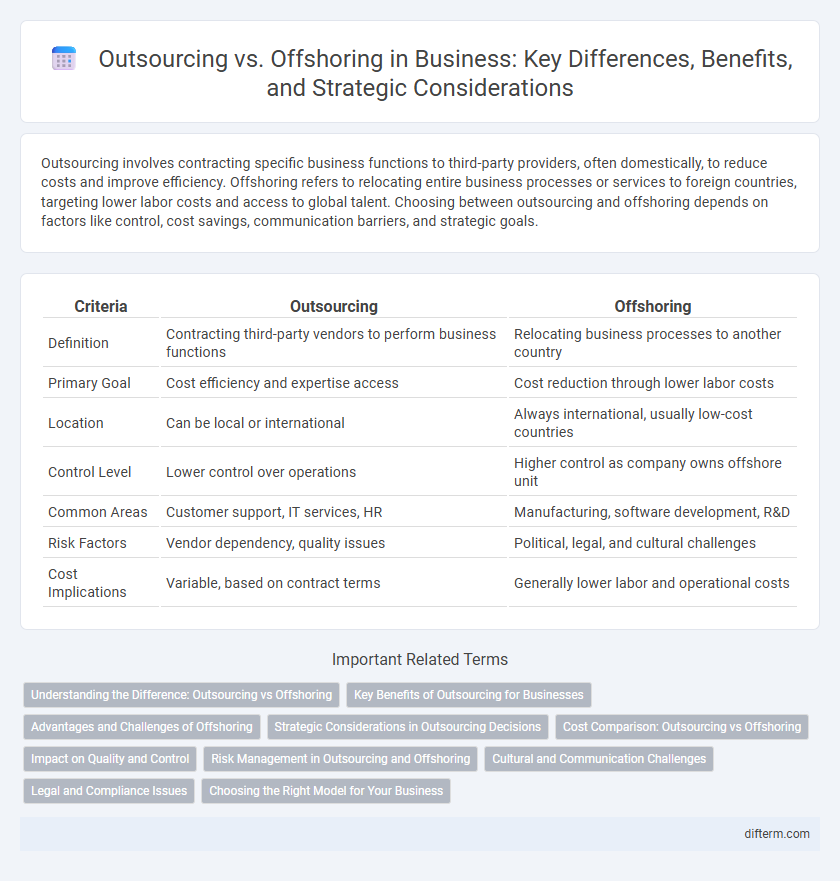Outsourcing involves contracting specific business functions to third-party providers, often domestically, to reduce costs and improve efficiency. Offshoring refers to relocating entire business processes or services to foreign countries, targeting lower labor costs and access to global talent. Choosing between outsourcing and offshoring depends on factors like control, cost savings, communication barriers, and strategic goals.
Table of Comparison
| Criteria | Outsourcing | Offshoring |
|---|---|---|
| Definition | Contracting third-party vendors to perform business functions | Relocating business processes to another country |
| Primary Goal | Cost efficiency and expertise access | Cost reduction through lower labor costs |
| Location | Can be local or international | Always international, usually low-cost countries |
| Control Level | Lower control over operations | Higher control as company owns offshore unit |
| Common Areas | Customer support, IT services, HR | Manufacturing, software development, R&D |
| Risk Factors | Vendor dependency, quality issues | Political, legal, and cultural challenges |
| Cost Implications | Variable, based on contract terms | Generally lower labor and operational costs |
Understanding the Difference: Outsourcing vs Offshoring
Outsourcing involves contracting third-party service providers to handle specific business functions, often locally or domestically, to reduce costs and improve efficiency. Offshoring refers to relocating business operations or processes to a foreign country, typically to leverage lower labor costs and access global talent pools. Understanding the distinction between outsourcing and offshoring helps businesses make informed decisions about operational strategies and resource allocation.
Key Benefits of Outsourcing for Businesses
Outsourcing offers businesses significant cost savings by leveraging specialized external providers, reducing overhead expenses and minimizing the need for in-house resources. It enhances operational efficiency through access to expert talent and advanced technologies without the long-term commitments associated with hiring. This strategy also enables companies to focus on core competencies, accelerating innovation and improving overall business agility.
Advantages and Challenges of Offshoring
Offshoring offers cost reduction by leveraging lower labor expenses and access to skilled talent pools in foreign markets, enabling businesses to scale operations efficiently. Challenges include managing cultural differences, time zone barriers, and potential quality control issues that can impact communication and project delivery. Successful offshoring requires robust coordination, clear contractual agreements, and strategic oversight to mitigate risks and maximize operational benefits.
Strategic Considerations in Outsourcing Decisions
Strategic considerations in outsourcing decisions center on cost efficiency, access to specialized expertise, and scalability to support business growth. Companies evaluate the balance between maintaining control over core competencies and leveraging external providers to enhance innovation and operational flexibility. Risk management, including geopolitical stability and compliance with regulatory standards, also plays a critical role in determining outsourcing viability.
Cost Comparison: Outsourcing vs Offshoring
Outsourcing often reduces operational costs by leveraging third-party vendors within the same country or region, minimizing expenses related to management and communication barriers. Offshoring typically offers greater cost savings through access to lower labor costs in foreign countries but may incur higher expenses in logistics, coordination, and regulatory compliance. Cost comparison reveals that outsourcing suits businesses prioritizing short-term savings and control, while offshoring benefits those targeting significant long-term reductions despite potential complexities.
Impact on Quality and Control
Outsourcing often involves delegating specific business functions to external vendors, which can lead to varied quality levels due to different management standards and less direct oversight. Offshoring, by relocating operations to another country, may introduce challenges in maintaining consistent control and quality due to cultural differences, time zones, and regulatory environments. Effective quality management systems and clear communication protocols are essential to mitigate risks and ensure alignment with organizational standards in both outsourcing and offshoring scenarios.
Risk Management in Outsourcing and Offshoring
Risk management in outsourcing involves mitigating potential issues such as loss of control, data security breaches, and compliance challenges through thorough vendor evaluation and robust contract management. Offshoring risk management requires addressing geopolitical instability, cultural differences, and supply chain disruptions by implementing stringent governance frameworks and continuous monitoring mechanisms. Both strategies demand comprehensive risk assessments and contingency planning to safeguard business operations and ensure service continuity.
Cultural and Communication Challenges
Outsourcing and offshoring often face significant cultural and communication challenges that can impact business efficiency and project outcomes. Differences in language, work ethics, and time zones frequently lead to misunderstandings, delays, and reduced collaboration effectiveness. Companies investing in cross-cultural training and robust communication tools tend to mitigate these issues, enhancing seamless coordination between onshore and offshore teams.
Legal and Compliance Issues
Outsourcing and offshoring present distinct legal and compliance challenges, with outsourcing often requiring stringent vendor contracts and data protection measures to meet domestic regulations. Offshoring introduces complexities related to cross-border data transfer laws, intellectual property rights, and jurisdictional compliance that vary significantly by country. Businesses must conduct rigorous due diligence and continuously monitor regulatory changes to mitigate legal risks and ensure adherence to international standards.
Choosing the Right Model for Your Business
Choosing the right model for your business requires analyzing cost efficiency, control over operations, and access to specialized skills. Outsourcing offers flexibility by delegating specific functions to external vendors, while offshoring involves relocating entire processes to another country for cost reduction. Evaluating project scope, regulatory compliance, and long-term strategic goals ensures alignment with your organizational needs.
Outsourcing vs Offshoring Infographic

 difterm.com
difterm.com